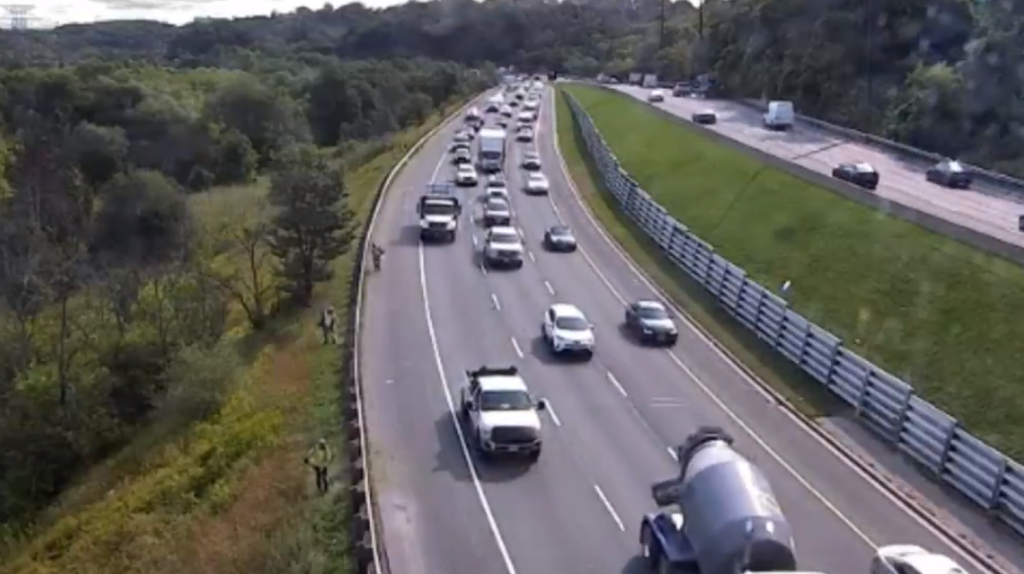Mulcair, Harper, Trudeau square off in feisty foreign policy debate
Posted September 28, 2015 9:02 pm.
Last Updated September 28, 2015 11:38 pm.
This article is more than 5 years old.
Justin Trudeau invoked his father’s ghost Monday night in an election leaders’ debate that was far more emotional and animated than the dry foreign affairs subject matter might have suggested.
Prime Minister Stephen Harper also amped up his ardour, pounding home the point that convicted terrorists have no home in Canada and can expect to be stripped of their citizenship, while painting his rivals as soft on security.
And the NDP’s Tom Mulcair asserted that New Democrats are prepared to send Canada’s military into combat, provided the mission has NATO or United Nations approval.
The debate, the fourth of five during the extraordinarily long, 78-day election campaign, was also remarkable for the capacity crowd of more than 3,000 paying — and occasionally partisan — patrons at Toronto’s Roy Thomson Hall.
The large live audience helped animate the well-paced debate with applause and laughter that punctuated the three leaders’ most cogent points.
A battle over federal stewardship of the economy was supposed to be this election’s defining issue, but emotive “values” questions have increasingly dominated the discourse.
Those values have been attached to the country’s place in the world: Canada’s handling of an international Syrian refugee crisis; the place of minority religious face coverings at citizenship ceremonies; and rescinding Canadian citizenship from convicted terrorists who hold dual citizenship.
Trudeau, the Liberal leader considered to have the most to lose in a two-hour debate on foreign policy, came out swinging.
On Syrian refugees, Trudeau drew applause when he invoked nearby Ireland Park in Toronto, where he said 38,000 Irish arrived in 1847 fleeing the potato famine. They arrived to a city of 20,000 citizens.
But it was under attack for supporting the contentious Conservative security bill, C-51, that Trudeau reminded viewers of his famous prime minister father.
“When we talk about the legacy that my father leaves behind, first and foremost is the Charter of Rights and Freedoms, which has defined Canada as a country that stands up for individual rights, even against governments that want to take those away,” said the younger Trudeau.
“Multiculturalism that has made Canada strong not in spite of its diversity, but because of its diversity….”
Trudeau added that the evening was emotional because it marked the 15th anniversary of Pierre Trudeau’s death.
“And I know he wouldn’t want us to be fighting the battles of the past; he’d want us squarely focused on the future and how we’re going to respond to Canadians’ needs, and that’s what we’re doing tonight.”
Harper stoutly defended his government’s policies to date on accepting Syrian refugees.
“We haven’t opened the floodgates,” said the prime minister. “Some European countries just started letting everybody in and now they’re trying to reverse those policies.”
Harper noted that the process has been sped up, “while maintaining our security and not literally spending tens of millions of additional dollars. And these are the numbers we’ve arrived at. We’re not chasing headlines.”
Harper’s repeated invocation of headline-hunting opposition parties earned a stern rebuke from Mulcair. Helping the world’s most vulnerable is not headline chasing, scolded the New Democrat.
The refugee issue has come up repeatedly during the election campaign, and with it the related arguments around how to approach the civil war in Syria, how to shape immigration policy, and what constitutes an optimal level of development aid.
On climate change, Harper said his government has been consistent in stating any international protocol required all countries to sign on and that he’s “very optimistic” the world will reach an historic accord later this year.
The next round of international negotiations on global climate change targets is scheduled for December in Paris. Harper has been accused of doing little to reduce Canada’s greenhouse gas emissions, and of mishandling pipeline negotiations by not demonstrating enough commitment to the environment.
Outside, partisans and protesters vied to get their messages out amid throngs of watchful police.
“Change the politics, not the climate,” said one protest sign.
Others asserted that only Harper is tough on terrorism, a direct rebuke to their counterparts urging “Hands off Syria.”
One man carried a huge sign reading “no no no” to all three leaders.
Both the Globe and Mail and Munk organizers said they invited leaders of parties with official status in the House of Commons, which requires at least 12 seats. The Green party, Bloc Quebecois and Forces et Democratie each had two seats when Parliament was dissolved.
The Greens have complained to the Canada Revenue Agency that the Munk format may run afoul of tax rules governing the political activities of charities.
The last leaders’ debate takes place Friday in Montreal, sponsored by the French-language network TVA.










